
Allison N. Steenson, The Hawthornden Manuscripts of William Fowler and the Jacobean Court 1603–1612. Routledge, 2020. Courtesy Amazon.com.
William Fowler (?1560-1612) was a Scottish poet, courtier, and translator, active from 1581 to 1612.
Life[]
Fowler was born about the year 1560.[1]
He attended St Leonard’s college, University of St. Andrews, between 1574 and 1578, and in 1581 he was in Paris studying civil law.[1]
Career[]
In 1581 Fowler issued a pamphlet against John Hamilton and other Catholics, who had, he said, driven him from his country.[1] The pamphlet, An Answer to the Calumnious Letter and erroneous propositiouns of an apostat named M. Jo. Hammiltoun, was published by Robert Lekprewick, at Edinburgh. Its dedication, dated from Edinburgh 2 June 1581, is addressed to Francis, earl Bothwell. Fowler sets forth what he alleges to be the errors of Roman Catholicism, and claims acquaintance incidentally with the earl of Crawford, Sir James Balfour, and other distinguished Scottish statesmen.[2]
Fowler was subsequently prominent as a burgess of Edinburgh. He has been doubtfully described as for a time pastor of Hawick, a living formerly held by Gavin Douglas.[2] On the title-page of The Triumphs of Petrarke, he stylee himself “P. of Hawick,” which has been held to mean that he was parson of Hawick, but this is doubtful.[1]
About 1590 he became secretary to James VI's wife, Queen Anne of Denmark.[2] He was engaged in political negotiations with England, and in 1597 wrote an epitaph on his friend, Robert Bowes, English agent at Berwick.[2]
In 1603 he accompanied his royal mistress to England, and was reappointed not only her secretary but her master of requests.[2]
His leisure was always devoted to poetry, and soon after his arrival in London he enclosed 2 sonnets addressed to Arabella Stuart in a letter to the Earl and Countess of Shrewsbury; they are printed in Nichols's ‘Progresses of James I,’ i. 250, 260–1.[2] In September 1609 he received a grant of 2,000 acres in Ulster.[2]
In 1609 his services were rewarded by a grant of 2000 acres in Ulster.[1]
His sister Susannah Fowler married Sir John Drummond, and was mother of poet William Drummond of Hawthornden.[1]
Writing[]
Fowler seems to have left the chief part of his poetry, virtually all of it unpublished, to his nephew William. This consists of 2 volumes, entitled The Tarantula of Love and The Triumphs of Petrarch. The former is composed of 72 sonnets in the manner of the Italian sonneteers, and the latter is a somewhat diffuse translation from Petrarch. These manuscripts were presented by Drummond of Hawthornden to the University of Edinburgh in 1627.[2]
2 other volumes of his manuscript notes, scrolls of poems, etc., are preserved among the Drummond MSS., now in the library of the Society of Antiquaries of Scotland.[1]
Specimens of Fowler’s verses were published in 1803 by John Leyden in his Scottish Descriptive Poems.[1]
The esteem in which Fowler was held by his contemporaries is illustrated by the commendatory sonnets (including a verse by the king) prefixed to his poems. His style is marked by the verbal and sentimental affectation of the period, but it is not seldom scholarly and graceful.[2]
Recognition[]
Fowler contributed a prefatory sonnet to James VI’s Furies; and James, in return, commended, in verse, Fowler’s Triumphs.[1]
Publications[]
Poetry[]
Allison L. Steenson, The Hawthornden manuscripts of William Fowler and the Jacobean court, 1603-1612. London: Routledge / Taylor & Francis, 2021.[3]
Non-fiction[]
- An Answer to the Calumnious Letter and Erroneous Propositions of an Apostat Named M. Jo. Hammiltoun. Edinburgh: Robert Lekprewick, 1581.
- Epitaphe vpon the death of Sir John Seton of Barns. Edinburgh: R. Waldegrave, 1594.
- A True Reportarie ... of the Baptisme of ... Prince Frederik Henry. London: Peter Short, for Widow Buttler, 1594
- also published as A True Report of ... the Baptisme of ... Henry Fredericke. London: Thomas Creede for Iohn Browne, 1603
- also published as A true account of ... the Baptism of his Royal Highness, Henry Prince of Scotland.Edinburgh: Philander, 1732.
Collected editions[]
- Works of William Fowler, Secretary to Queen Anne, Wife of James VI (edited by James Craigie & John Purves). (3 volumes), Edinburgh & London: William Blackwood, for the Scottish Text Society. Volume I 1914; Volume II, 1936, Volume III, 1940.
Except where noted, bibliographical information courtesy WorldCat.[4]
See also[]
| |||||||||||||||||
References[]
Stephen, Leslie, ed. (1889) Dictionary of National Biography 20 London: Smith, Elder, p. 89title=Fowler, William (fl. 1603)
Chisholm, Hugh, ed (1911). "Fowler, William". Encyclopædia Britannica. 10 (11th ed.). Cambridge University Press. p. 761.
Notes[]
- ↑ 1.0 1.1 1.2 1.3 1.4 1.5 1.6 1.7 1.8 Britannica x. 751.
- ↑ 2.0 2.1 2.2 2.3 2.4 2.5 2.6 2.7 2.8 DNB xx 89.
- ↑ Search results = kw:Hqwthornden au:Steenson, WorldCat, OCLC Online Computer Library Center Inc. Web, Feb. 12, 2022.
- ↑ Search results = au:William Fowler 1612, WorldCat, OCLC Online Computer Library Center Inc. June 21, 2016.
External links[]
- Poems
- William Fowler at PoemHunter ("Sonnet")
- William Fowler at AllPoetry ("Sonnet")
- William Fowler at Poetry Nook ("In Orknay")
- "Epitaph upon the Death of M. Robert Bowes Esquire"
- from "Tarantula of Love" (16 sonnets)
- Books
- The Works of William Fowler (3 volumes, vol I 1914, vol II 1936, vol III 1940) Scottish Text Society, Edinburgh
- About
- William Fowler (1560-1612) at English Poetry, 1579-1830
- William Fowler in the Literary Encyclopedia
- "Heretical Love-words: The poetry of William Fowler" (abstract)
This article incorporates text from a publication now in the public domain, the Dictionary of National Biography (edited by Leslie Stephen). London: Smith, Elder, 1885-1900. Original article is at: Fowler, William (fl. 1603)
This article incorporates text from a publication now in the public domain, the 1911 Edition of the Encyclopædia Britannica. Original article is at Fowler, William
|